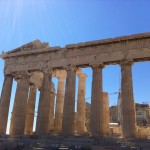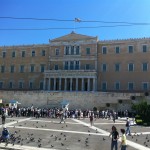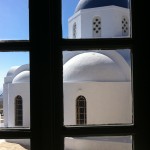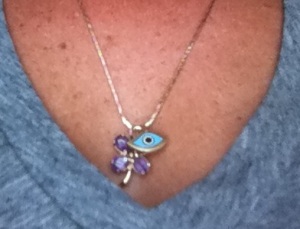
watch out - i've got my eye on you!
i am not a superstitious person but i’m fascinated with people and cultures that are AND, of course, the superstitions themselves. in Greece there are sure to be many superstitions but one you cannot avoid is the “EVIL EYE”. that blue eye you see everywhere that makes you feel like you are being watched at all times practically burns a hole in your mind. like so many places i have visited with a variety of superstitions, i also embrace Greece and their interesting belief of the evil eye. BUT, in my case, before i could assume i had the ‘evil eye’ curse cast upon me when i felt any of below feelings while in Greece i had to ask myself – “how much ouzo did you drink last night?”
i now proudly wear an evil eye of my own to protect myself against any ill-wishing someone might have for me. (by the way, if that doesn’t work i will sick my voodoo doll on you) do you think i’m superstitious but in denial? nah…i just like to collect charms that have special meaning from the amazing places i am fortunate enough to visit.
a bit more about the EVIL EYE:
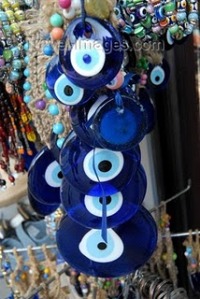
watching you everywhere (photo: hellnotesforbeauty.com)
what is the Evil Eye
A superstition that a glance can cause misfortune, sickness or even death to those on whom it falls, can come from anyone at any moment or you can draw it to yourself. The belief was found in ancient Greece and Rome as well as in folk cultures around the world, and it has persisted into modern times. Children, women and animals are believed to be particularly vulnerable. The evil eye is often thought to stem from envy and malice toward prosperity and beauty, and thus in many cultures unguarded praise of one’s possessions or children is thought to invite misfortune. Many traditions believe strangers, malformed or blue-eyed individuals and old women are most likely to cast the evil eye curse. Safeguards include amulets, charms, and sacred texts.
measures to ward off the Evil Eye
Even though the Orthodox church says that the only things that can really protect you are crucifixes and icons from monasteries and churches (as opposed to souvenir shops) and first and foremost true faith, many Greeks hang little blue eyes around their necks and wrists. Despite their dubious effectiveness at warding off evil, the blue glass charms make nice souvenirs from a trip to Greece and – if nothing else, can be appreciated for their aesthetic qualities. Either way, it doesn’t hurt to have one hanging someplace…. Just like when you knock on wood, cross your fingers or wish someone to break a leg. You can get these in almost any jewelry or souvenir shop.
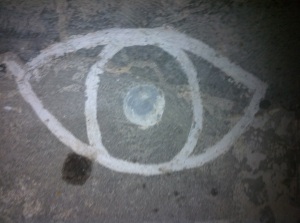
warding off evil in front of homes
why the blue eye
Because light or blue-eyed individuals are likely to cast the curse – is one of the possible explanations given for the colour and shape of the protecting amulets, but there are many more, often intertwined and conflicting, theories on their origins and form. Another possible reason for the choice of the colour blue is the fact that it is associated with water, which symbolises life and healthiness – in this way it is a kind of antidote to the “drying up” – a metaphor for withering away, being sick, or even dying, caused by the evil eye.
example of when the Evil Eye curse may have been cast
There you are in an afternoon meeting, refreshed from a good eight-hours of sleep, satisfied from a healthy lunch and eager to discuss with your boss you new plans, when suddenly you head goes thick and hurts all over and your breath becomes short, nausea seeps up your trachea and you lose you sense of balance, now being unable to think or communicate properly, as if you’re moving in heavy syrup.
You feel alarm because you can’t find a rational explanation for this state. It could be a headache but it’s not just your head that hurts. Maybe it’s something you ate? Can you eat poisonous pasta? That would explain the nausea but about he head-to-toe aching and dizziness and the notion of foreboding?
In Greece you won’t be considered foolish or insane if you simply assume it’s an evil eye curse.
**evil eye info. from athensguide.com and balkantravellers.com

 Follow
Follow